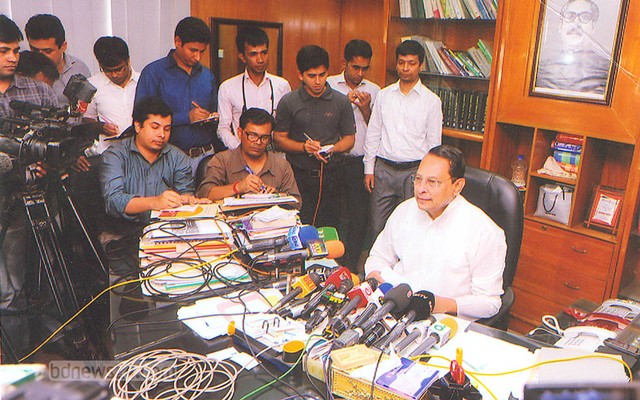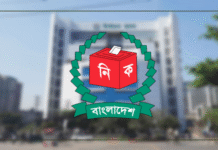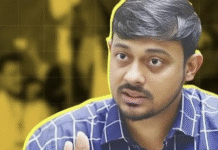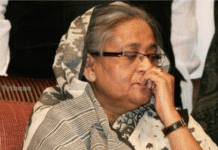Hasanul Haq Inu wonders why some Awami League leaders are echoing their BNP counterparts on his party’s suspected involvement in the assassination of Bangabandhu Sheikh Mujibur Rahman.
Inu heads the Jatiya Samajtantrik Dal (JaSaD), an ally of the Awami League, and serves as the information minister.
Media reports said Awami League Presidium member Sheikh Fazlul Karim Selim alleged that JaSaD was responsible for creating the ground for the assassination of the nation’s founding father.
Following his remarks, BNP’s acting spokesperson Asaduzzaman Ripon blamed Inu’s party for the instability in Bangladesh after the Liberation War until 1975.
JaSaD later issued a statement saying such remarks will create confusion in the ruling 14-Party alliance led by the Awami League.
Speaking to reporters on Wednesday, Inu referred to the then Awami League leaders joining the Khandaker Mushtaq Ahmed-led Cabinet, which was in power after the Aug 15, 1975 killings of Sheikh Mujib along with most of his family members.
“The attempt or conspiracy to link JaSaD with Bangabandhu’s assassination is (futile).
“Following investigations and trials, the judges have given their verdict and observation. JaSaD is not mentioned anywhere in the case documents,” he said.
Inu joined JaSaD in 1972 after leaving the Awami League’s student front Bangladesh Chhatra League.
He said his party’s activities before and after the killing of Bangabandhu were widely reported in the media then.
“I would only say I don’t know why this sudden digging up of JaSaD…some BNP and Awami League leaders are speaking in the same tune. I do not even know whether there are any links between these similar remarks.”
Media reports quoted Awami League MP Selim, a cousin of Prime Minister Sheikh Hasina, as saying on Aug 23, “Anti-liberation forces would have never been able to attack Bangabandhu if the Ganabahini and JaSaD had not created that situation by opposing him, robbing and murdering people, and killing MPs.”
“That’s why the main mystery behind Bangabandhu’s murder must be solved and people who were involved identified,” Selim was quoted as saying.
The next day, the BNP’s International Affairs Secretary Asaduzzaman Ripon blamed JaSaD for the instability from 1972 to 75 and demanded inquiry into their role at that time.
Awami League Joint General Secretary Mahbub-Ul-Alam Hanif and BNP Standing Committee member Gayeshwar Chanrda Roy also made similar comments.
JaSaD chief Inu said Sheikh Selim’s comments did not reflect the ruling party’s political position, but said similar remarks from the BNP and the Awami League leaders were creating confusion among the alliance.
Asked whether they would leave the alliance amid such criticisms, Inu said: “The Awami League and JaSaD are united on principle. We are together in movements, in the elections and in the government.”
JaSaD had left Awami League’s side and opposed the government led by Bangabandhu. But it joined the Awami League-led coalition in the 1980s and is still a member of it.
Hinting at several Awami League leaders joining the Khandaker Mushtaq’s Cabinet after his murder, Inu said: “Everybody knows who sided with Mushtaq’s government for a slice of the pie.”
Around 18 members of the Cabinet led by Bangabandhu joined Musthaq’s government, many of whom afterwards joined the BNP and Jatiya Party.
But some like Abdul Mannan, Adbul Momen, Dewan Farid Gazi rejoined the Awami League.
“Except for some dedicated leaders, including the four national leaders, many (Awami League leaders) had then scrambled to be on good terms with Musthaq,” said Inu.
The JaSaD chief said it was his party that had circulated pamphlets in Bangladesh opposing the Mushtaq government.
“A lot of JaSaD leaders were arrested during Musthaq’s 83-day term, over 70 JaSaD activists were murdered. No JaSaD leaders joined hands with Moshtaq.”
Those linking JaSaD with the killing of Bangabandhu are either ignorant of history or hatching a conspiracy, said the information minister.
“It’s those people jealous of the Grand Alliance government’s achievements that are trying to create confusion among the partners.”
Inu, however, evaded a direct answer to media query whether JaSaD had made any mistakes after the Liberation War.
“Many steps need to be taken…History will decide what was right or wrong. I am no one to judge it,” is what the JaSaD chief said.
Source: Bd news24










